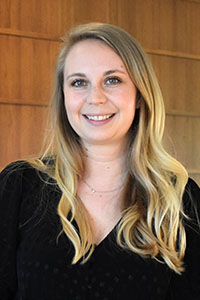Elizabeth Burgin joins W&M Counseling faculty

This fall, the School of Education welcomes seven new faculty members. Today, we introduce Elizabeth Burgin, who joins us as an assistant professor in the Counselor Education program and program coordinator of the Military and Veterans Counseling Program.
Tell us a little about your background and what brought you to W&M.
I am originally from Reno, Nevada and went to college in New York to study fashion design. I worked as a designer after college but wanted to find a way to serve my community, so I decided to study counseling. I completed a master’s degree in Counseling and Human Services with a concentration in addiction at the University of Colorado Colorado Springs. In Colorado, I provided home and community-based services to criminal-justice involved adults and their children in the foster care system.
I trained in play therapy because I felt like I needed a more developmentally responsive way to help parents and their children establish safe relationships. Ultimately, I pursued my doctorate in counseling at the University of North Texas with a specialty in play therapy. At UNT, I was the program manager for a grant providing play therapy, assessment, parent and teacher services in Title I pre- and elementary schools for children who experienced Adverse Childhood Experiences.
At the same time, I was focused on providing counseling to military populations because, as a military spouse, I was living in and working with military-connected adults and children. For the last several years, I have been involved in establishing best practice strategies for counseling military populations. There is a significant need to improve the accessibility of culturally responsive mental health care for military members and their families. I joined the faculty at William & Mary to lead to Military and Veterans Counseling specialty track. The faculty in the counseling program created an incredible resource for students and the military community and I am excited to be here.
What’s your area of research and what question are you most passionate about answering right now?
Right now, I am really interested in exploring treatment approaches to moral injury for service members. So many treatment approaches endorsed for military populations are focused only on specific symptom reduction but may miss some of the major meaning-making and self-concept components that are salient to warrior identity. Overall, I hope that by approaching outcome research with a strengths-based, wellness value system, counselors will be able to reduce barriers to care for military populations.
What else are you hoping to get involved with on campus or in the community?
I would love to create partnerships with the military community, both on campus and in the surrounding area. The military community is representative of diverse identities and connections to service, so I’d like to amplify the voices of stakeholders already doing important work and find ways to improve military members’ access to mental health resources. Long term, I hope to train counselors in play therapy and increase the availability of play therapy services in this area by partnering with clinics and local schools.